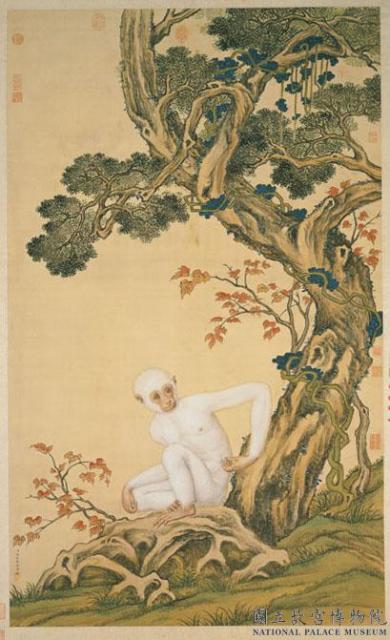清郎世寧畫白猿 軸
推薦分享
資源連結
連結到原始資料 (您即將開啟新視窗離開本站)後設資料
- 資料識別:
- 故畫000954N000000000
- 資料類型:
- 類型:繪畫
- 型式:靜態圖像
- 著作者:
- 郎世寧
- 主題與關鍵字:
- 柏 猿 楓樹.槭樹 藤蘿
- 出版者:
- 數位化執行單位:國立故宮博物院
- 格式:
- 本幅 151.2x91.9公分、全幅 117.5公分
- 關聯:
- 石渠寶笈續編(重華宮),第四冊,頁1864&*故宮書畫錄(卷五),第三冊,頁573&*故宮書畫圖錄,第十四冊,頁41-42&* 郎世寧(西元一六八八-一七六六年),意大利人。十九歲進入天主教耶穌會為修士,習畫與建築。二十七歲至中國,歷任康熙、雍正、乾隆三朝內廷畫官。擅長人物、犬馬、花鳥。尤以犬馬聞名。 翠柏丹楓根下坐一白猿。一手撫腳。一手搔癢。悠悠閒暇。不僅畫出猿之形態,且兼得猿之性情。 &* Giuseppe Castiglione (Chinese name Lang Shih-ning) was a native of Italy. At the age of 19, he entered the Jesuit order as a novitiate. In addition to his religious training, he also studied painting and architecture. In 1715, he was sent to China, where he would spend the rest of his life as a painter in the Inner Court. He was a skilled painter of figures, flowers-and birds, and especially horses and dogs. In this painting, a white gibbon sits on the root of a cedar and next to red maple saplings. With one hand rest on its knee, the other scratches an itch in leisurely contemplation. The artist has not only succeeded at capturing the appearance of the gibbon, but also its disposition. &* 朗世寧(西元一六八八-一七六六年),義大利人,十九歲時,入主天主教耶穌會為修士。二十七歲來華傳教,以繪事供奉內廷。歷仕康熙、雍正、乾隆三朝。畫法參酌中西。 朗世寧以明顯的光影烘托畫出白猿柔軟細密的毛髮及其生動的搔癢姿態。雖然沒有題款指出此白猿的來源,但經過專家比對,此猿可能是產於雲南、緬甸、印尼、馬來西亞、泰國等區域的白手長臂猿。 &*Lang Shih-ning was an Italian who at the age of 19 became a novitiate of the Jesuit Catholic order. At 27, he arrived in China as a missionary. With an art background, he also painted for the court under the K’ang-hsi, Yung-cheng, and Ch’ien-lung emperors. His style fuses Chinese and Western techniques Castiglione has used obvious shadows here to set off the fine and soft fur of this white gibbon and to render its lively scratching pose. Though there is no inscription indicating the origin of this gibbon, the precise rendering of details suggests that it actually existed that was painted from life. Experts have indicated that this gibbon is indigenous to the area of Yünnan, Myammar, Indonesia, Malaysia, and Thailand. &*郎世寧存世作品多為皇家人物畫像與動物圖像。動物如駿馬、駿犬、鷹等多為各方進貢之物,此件白猿僅有款識「臣郎世寧恭繪」。畫中白猿蹲坐地上,左手抓弄著毛皮,毛色的描繪十分精緻,眼睛部份反光的描寫更具有立體效果,整個面容散發出一股觀察觀者的神情,似乎具有相當靈性。此畫為郎世寧款,但樹石具有中國傳統畫風,顯非出自郎世寧之手。&*Many of the surviving paintings by Giuseppe Castiglione are figures and animals related to the Ch’ing imperial court. The animals mainly include steeds, hounds, and falcons that had been presented to the court as tribute. This painting of a white gibbon bears a short signature by Castiglione using his Chinese name and reads, “Reverently painted by Your Servant, Lang Shih-ning.” The white gibbon is shown sitting on the ground and scratching itself with its left hand. The rendering of the fur is done with great finesse, and the reflections in its eyes reveal a strong sense of volume. In fact, the gibbon’s face seems to suggest that it was aware of being observed by the viewer, as if indicating a degree of psychological presence by the subject. Although this work is signed only by Castiglione, the tree and landscape elements are done in traditional Chinese styles that suggest the hand of another artist.
- 管理權:
- 國立故宮博物院
授權聯絡窗口
- 國立故宮博物院圖像授權、出版授權、影音資料授權-申請流程說明
http://www.npm.gov.tw/zh-TW/Article.aspx?sNo=03003061






